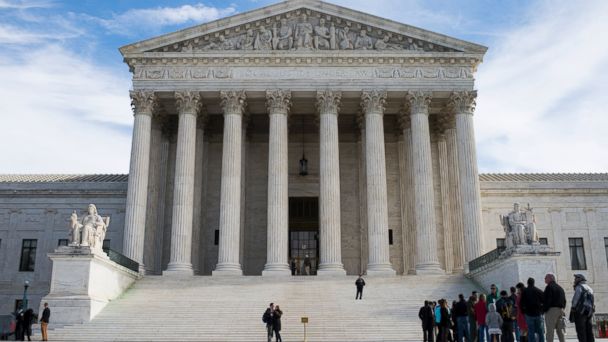Supreme Court Wades Into Bizarre Love Triangle Case

Bill Clark/CQ Roll Call/Getty Images
A case ripped from tabloid headlines will come to the hallowed Supreme Court chamber this week when the justices hear about a romantic rivalry gone awry.
Carol Anne Bond of suburban Philadelphia decided to take revenge when she learned that her husband was the father of her best friend's baby. Bond, a microbiologist, stole an arsenic-based chemical from her boss and mixed it with other chemicals she bought on the Web and then smeared it on the car door, door knobs and mail box of former friend Myrlinda Haynes. Repeatedly.
It was not a sophisticated attack. Indeed, the chemicals were easy to spot because they were bright orange. But Haynes, whose worst injury was a chemical burn on her thumb, had no idea who was trying to poison her.
READ: Wife Tries to Poison Husband's Pregnant Lover
Police did little to help her solve the mystery so she turned to the Post Office for help. Surely, they would investigate the attack on her mail box.
Indeed, postal inspectors installed a surveillance camera and captured Bond in the act.
What happened next triggered the Supreme Court's interest in the case. Federal prosecutors decided to charge Bond under a federal law that was passed to comply with a Chemical Weapons Convention treaty.
The criminal provisions of the law forbids the knowing possession or use of any chemical that "can cause death, temporary incapacitation or permanent harm to humans or animals."
RELATED: Supreme Court Kicks Off New Term As Hot-Button Issues Await
Paul Clement, Bond's lawyer, argues that federal prosecutors had no business interfering with a local matter and charging his client under a section of the Chemical Weapons Convention Implementation Act.
"Her actions did not involve chemical warfare, stockpiling chemical weapons, or any other activity the Convention prohibits signatory states from undertaking," Clement, who's most recently known for opposing the Obama health care law, writes in court briefs. "This domestic dispute arising out of marital infidelity, and culminating in a thumb burn, thus would seem to be a natural candidate for local law enforcement."
Under the federal law, Bond was sentenced to six years in federal prison. Clement says if her prosecution had been left to state law enforcement, she would have likely been sentenced to around 25 months. He says that while regrettable, her acts do not fall under the warlike conduct that the federal law is meant to target.
The government defends Bond's prosecution and says that the prohibition on the use of chemical weapons applied to Bond's actions. "The text and background of the underlying treaty show why States Parties agreed to penalize individual malicious use of toxic chemicals, and the Constitution's text, history, and this Court's precedents make clear that Congress has the power to implement that rational obligation," Solicitor General Donald B. Verrilli Jr. writes in Court briefs.
But lurking behind the tabloid facts of the case is a long-simmering dispute regarding the balance of power between the federal government and the states.
"This case raises fundamental questions about whether there are any limits on Congress' authority to implement an international treaty," Clement said.
Georgetown Law professor Nicholas Quinn Rosenkranz, who filed a brief in support of Bond on behalf of the libertarian Cato Institute, agrees.
"This case implicates a basic axiom of constitutional law, which is that federal power is limited," he said. "The administration's position in this case is inconsistent with that basic axiom. According to the Solicitor General, Congress's power is not limited to the subjects listed in the Constitution; it can be increased, at will, by treaty."
The dispute stems from a 1920 Supreme Court case called Holland v. Missouri that has been interpreted to say that the treaty clause can be used to circumvent the structural limits on the power of the federal government.
Rosenkranz urges the court to overturn the precedent. "The constitution gives Congress limited power and Holland seems to say that a treaty can increase that power, potentially without limit," he said
A lower court questioned the prosecutorial discretion that was used to charge Bond, but affirmed Bond's conviction under the law.